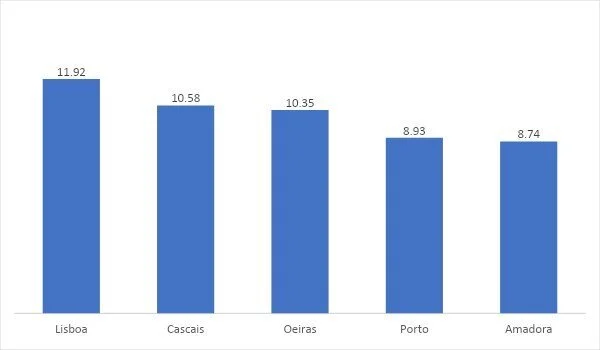Entrepreneurs: Everything you need to know before moving to Portugal with your family
Many international entrepreneurs are drawn to Portugal for several reasons: a safe, peaceful and sunny destination, Portugal also offers a business-friendly environment and a vibrant startup ecosystem. If you’re looking to start fresh somewhere new, here’s what you need to know before relocating with your family.
InterNations ranked Portugal the fifth-best country in the world for expats in 2021, being the only European country to make it into the top 10. In fact, Portugal has an exceptional quality of life and is, therefore, a top choice for entrepreneurs moving with families.
Safety and affordable prices, government support, international schools, social stability, personal safety, English proficiency, and a universal healthcare system are only a few reasons why.
This is what entrepreneurs need to know before moving to Portugal with their families
The smell of the ocean filling the air. Sunbathing mid-winter. Year-round golfing. The minute you set foot in Portugal you can see why it is so popular among expats. And, of course, there’s the genuinely friendly spirit of the Portuguese that makes it such a natural choice for entrepreneurs moving to Portugal.
In 2021, Portugal came fifth in a ranking of expat locations by InterNations, becoming more and more popular among digital nomads.
Here is a compilation of useful information on how you can relocate to Portugal with your family as an entrepreneur.
Universal healthcare
Portugal has a public national health service that every resident is entitled to use. It’s essentially similar to the NHS in the UK and a pretty successful system, too. A ranking of 191 national healthcare systems around the world by The World Health Organization in 2021 put Portugal in 12th place.
The Serviço Nacional de Saúde (SNS) is available to all Portuguese citizens, free for under-18s and over-65s, and heavily subsidised for everyone else. Fortunately, the SNS is also available to non-citizens, although prices may be a little less subsidized. All you need to do is get your national health system number after you have your resident permit.
Affordable cost of living
One of the most appealing aspects of moving to Portugal is its affordable living costs. A family of four estimated monthly costs are 1,863.65€, without rent. That means the cost of living in Portugal is, on average, 27% lower than in the United States.
The more you go outside of the main cities, the cheaper living costs are. Lisbon, being the capital and the main business hub, is more expensive than just about anywhere else in Portugal.
For reference, rent in Portugal is, on average, 48% lower than in the United States. These are the median values per square meter in Portugal’s most expensive cities:
MEDIAN RENT VALUES PER SQUARE METER IN PORTUGAL’S MOST EXPENSIVE CITIES (2020) - Source: Idealista
Nominal wages in Portugal increased in 2019 to 1188.06 €/month, from 1170.63 €/month in 2018, way lower than the average nominal wage in the European Union. The cost of living in Portugal is lower than in any other Southern European country, and sensitively below average compared to Northern Europe. Basic services, transport, and groceries are all very cheap when measured against countries like the US, UK or The Netherlands.
Tax breaks for foreigners under the Non-Habitual Resident Status (NHR)
The “non-habitual residents” are the individuals who actually transfer their residency to Portugal (i.e., become tax resident in Portugal) and, during the five years prior to their registration as resident taxpayers, were not domiciled, for tax purposes, in Portuguese territory. A special tax regime has been created in 2009 for such a category, with the aim of attracting qualified professionals, high net worth individuals and foreign pensioners to Portugal, with a notorious impact on Portugal’s international highlight. This fiscal regime grants a 20% tax rate or a total exemption on the taxation of income of expatriates who choose to live in Portugal, for 10 years.
In 2020, a major change in the NHR regime took place: the foreign-sourced pension exemption was eliminated, being replaced with a 10% flat tax. In fact, the NHR tax regime was created to attract to our country professionals of high added value activities and the so-called “high net worth individuals”, intending to rival with some competing systems in force in other countries (namely, in Italy and in the United Kingdom) and increase Portugal’s international competitiveness.
Governmental support for Visas and residence permits
As an EU resident, you don’t need a visa to live in Portugal. Keep in mind that you do need to register within 90 days of your arrival, though. This is easy enough to do, with a quick visit to your local parish (Junta de Freguesia).
However, if you intend to move to Portugal and you’re from outside the EU, you’ll need a visa in order to establish residence. The process is not complicated at all: in fact, Forbes has listed Portugal as one of the best places for residency and a second passport. Some of the most common visa options include a Schengen Visa (these are short-term, tourist visas required from some countries), Study or Work Visas, Tech and Startup Visas and Golden Visas for those looking to invest in the country.
Golden Visas have been very popular with expats who wish to buy real estate in Portugal – though there are a number of other investment types that will qualify. One of the reasons for the program’s success is that it provides awardees with the right to family reunification. Family reunification refers to the situation where family members join another member of the family who is already living and working in another country in a regular situation.
Obtaining a Golden Visa in Portugal also allows entrepreneurs to waive the usual residence visa procedure. Those who gain a residence permit this way receive permission to live and work in Portugal, as long as they spend at least one week in-country during the first year, and at least two weeks during each year after that.
If obtaining a Golden Visa is in your plan, take into account that the regime recently underwent some changes: from January 2022, it will no longer be valid for the metropolitan areas of Lisbon and Porto, in an attempt to channel investment to the inland areas of the country.
Portugal is home to a wide range of international schools
Because of the unique challenges of moving to a new country, expat families living in Portugal may want to enrol their children in a school that teaches in their native language and offers Portuguese (or other) language classes in addition.
International schools in Portugal follow international educational standards, with curriculums used by the US, the UK, France, or Germany.
In Lisbon’s St. Dominic’s International School, 600 students from over 40 nationalities share a highly respected and well-known international school. In Porto, CLIP International School of Oporto offers an international curriculum based on the National Curriculum for England, with certain modifications to suit both the school’s philosophical and pedagogical objectives and the local context of CLIP.
But great international schools can be found outside main cities as well. CLIB - The Braga International School is a private school created for children between 3 and 18 years of age. Further south, Nobel International School Algarve is the oldest and largest private school group in the south of Portugal, offering its 1000-strong student base a top-notch educational experience.
Portugal, a safe country
Portugal ranks fourth in the global peace index, just below Iceland, New Zealand and Denmark, and above Slovenia, Austria and Switzerland. To put it in a bit more perspective, the United Kingdom sits at position 33 and the United States at 122.
Portugal Covid-19 response has curbed the effects of a third wave
After a second national lockdown in January, Portugal brought the infection rate to a halt. With the lessons learnt from previous outbreaks, Healthcare officials were able to react more quickly and to adapt to the circumstances.
A successful mass vaccination program is underway, with the goal to inoculate the entire population by the end of summer. Although the Lisbon area is still under some degree of restriction, businesses, cinemas, high schools, universities and indoor areas of restaurants were given the green light to reopen in most of Portugal.
A warm polyglot nation
Portugal’s population is made of warm, welcoming people. Most of the population understands and speaks English - and some will probably understand if you speak Spanish or French as well. It’s no coincidence that Portugal ranked #7 out of 100 countries in the English Proficiency Index of last year.
A good year-round climate, fantastic beaches, top tier international schools, great food, high quality of life and low living costs are just some of the reasons expats are moving to Portugal. There are also a number of successful tax incentives that foreign citizens can benefit from. If you are considering starting fresh in this exciting and welcoming country, contact our team.


